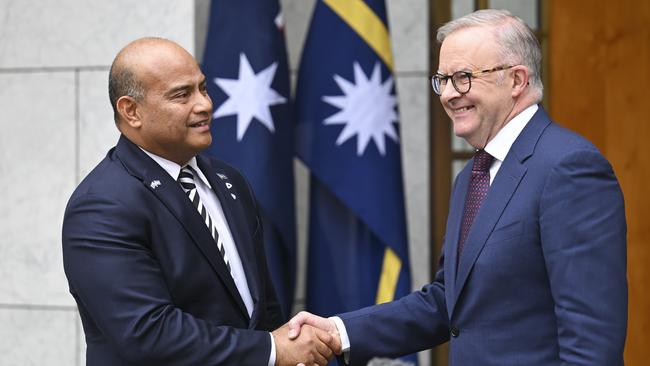Nauru treaty sidelines China with security veto for Australia
Australia will be able to block visits by Chinese warships to Nauru and get a veto over the country’s future security, banking and telecommunications relationships.

Australia will be able to block visits by Chinese warships to Nauru and get a veto over the country’s future security, banking and telecommunications relationships in return for $140m in Australian taxpayer support.
Under a new bilateral treaty, Australia will also guarantee ongoing banking services to the Pacific microstate, with the Commonwealth Bank agreeing to step in after Nauru stoked fears it could allow a Chinese bank to become the country’s sole financial institution.
Anthony Albanese and Nauru President David Adeang announced the treaty in Canberra on Monday in Australia’s latest move to thwart Beijing’s ambitions to expand its security footprint in the Pacific.
Discussions on the agreement had been under way for two years but the government accelerated its efforts after Nauru switched its diplomatic ties from Taiwan to China in January and signed an agreement with the Bank of China in April to explore banking ties.
The Prime Minister said the agreement would take the nations’ relationship to a new level, securing Nauru’s long-term economic resilience and security.
“The treaty underscores Australia and Nauru’s commitment to strengthening Pacific-led solutions to meet our region’s security, economic and development needs” Mr Albanese said. “This treaty will make our region stronger and make it safer.”
Mr Adeang thanked Australia for its “steadfast support” for his country, which the UN has declared is the Pacific’s most vulnerable state. “This treaty reaffirms our deep friendship and shared commitment to building a prosperous and secure future for our two nations and our region,” he said.
Under the treaty, Australia will provide $100m in direct budget support to Nauru over five years, and $40m over five years to improve the country’s policing and security through improved recruitment, training and infrastructure.
It gives Australia the right to block any agreements affecting Nauru’s security, banking and telecommunications sectors, while Nauru has provided an undertaking that it will not allow its critical infrastructure, including ports and aviation facilities, to be used by other countries for security purposes.
Nauru feared its population of about 13,000 would be left “unbanked” after the Bendigo Bank announced it was departing the country next year.
At the Australian government’s request, the Commonwealth Bank will take over Bendigo’s operations in Nauru without any taxpayer-funded sweeteners.
Similar security agreements are on offer for other Pacific countries following the Albanese government’s landmark 2023 security and migration treaty with Tuvalu, but experts believe it’s unlikely other states are interested in tying their futures as closely to Australia.
The treaty comes as the government prepares to formally announce this week that Papua New Guinea will get a new NRL team backed by $600m in Australian taxpayer support over the next decade.
The Albanese government has been working furiously to prevent other Pacific nations from falling under Beijing’s sway after the shock 2022 Solomon Islands-China security deal.
The Lowy Institute’s Pacific Islands program manager, Mihai Sora, said Pacific nations were driving a hard bargain, knowing Australia was determined to keep China at bay. “The strategic stakes are increasing, and Pacific countries acutely understand the value of their sovereignty and their strategic choices, in shaping geopolitical competition in the region. This is just a reality that Canberra faces today and into the future,” he told The Australian.
“Taken in this light, Nauru’s switch of diplomatic recognition from Taiwan to China in January this year might have been a way for Nauru to increase the pressure on Australia for a better deal.”
Opposition foreign affairs spokesman Simon Birmingham said the Coalition welcomed any measures to secure a free and open Pacific, but would closely scrutinise the treaty.
“While this Labor government has promised much in the Pacific, their announced agreements have not always been fully concluded, ratified, and implemented,” he said.
“It is up to the Prime Minister to ensure this deal has the support that is required to make a smooth transition towards ratification and implementation.”
Australia is hoping Vanuatu will return to the negotiating table after its upcoming election following the collapse last year of a bilateral security agreement between the countries, but the prospect appears slim.
Kiribati – the South Pacific’s most pro-China nation after Solomon Islands – has already rejected Australia’s offer of a similar security tie-up to the Nauru and Tuvalu deals.




To join the conversation, please log in. Don't have an account? Register
Join the conversation, you are commenting as Logout